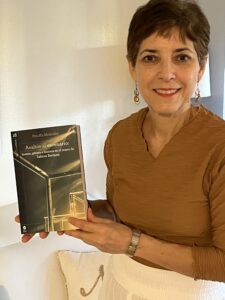Faculty Spotlight – Priscilla Melendez
 Priscilla Meléndez
Priscilla Meléndez
Professor
Hispanic Studies
Language and Culture Studies
I come from a family whose identity centered on “opposite” activities: reading and sports. Growing up with a father who loved sports (especially baseball) but who would constantly read aloud to his three children Spanish and Latin American short stories and poetry, and knowing that my maternal grandmother was not only a suffragist and pharmacist, but someone who participated as a college student in poetry recitations, deeply touched our lives. Not surprisingly, my oldest sister pursued a masters in English language and literature, while my brother and I followed the path of teaching Spanish. (For those curious about my sports’ “career” … it has been defined by passion and joy but not necessarily talent.)
I spent much of my summers as an adolescent reading plays –by Lope de Vega, Calderón de la Barca, Sor Juana Inés, Valle-Inclán, García Lorca, Buero Vallejo—, a passion that I continued at the university of Puerto Rico, not yet knowing that I would later pursue a Ph.D. precisely in the field of Latin American theater at Cornell University. I have been teaching at the university level for thirty-eight years, and I continue to greatly enjoy this magnificent career. Being surrounded by young and creative students who are constantly challenging intellectual boundaries has allowed me to stay current, and the opportunity to hear about and touch their lives through literary and cultural analysis has been a privilege. In consonance with classroom dynamics, the possibility of writing and sharing my research findings with others has not only enhanced my teaching but has allowed me to establish a dialogue with scholars from different persuasions and theoretical stands.
I have centered my research on twentieth and twenty-first century Mexican, Caribbean and Southern Cone theater, navigating the histories and cultures of regions that are rich in artistic productions. Although my first two books explored particular aspects of the theater of various Latin American countries (Mexico, Argentina, Perú, Puerto Rico, Cuba), my latest book Asaltos al escenario: Humor, género e historia en el teatro de Sabina Berman (December 2022), is devoted to a singular and prolific Mexican writer whose career as a playwright has been highly distinguished and whose work spans from the experimental and the political to the farcical. Needless to say, my passion for Latin American theater has not interfered with my desire to teach and publish about Latin American narrative.
I began my career at large public state institutions –Michigan State University and Penn State University— but the experience of teaching at a Liberal Arts College for ten years has been truly fulfilling. Although I was able to establish close connections with the students and colleagues of those larger institutions, being at Trinity has allowed me to participate in an academic environment where interaction between disciplines and collaboration among colleagues are paramount values, and this has been extraordinarily rewarding.
Priscilla’s latest publication:
 In Asaltos al escenario: Humor, género e historia en el teatro de Sabina Berman, Priscilla Meléndez explores the way in which Mexican playwright Sabina Berman (1956) confronts the history of her country and brings to the theater its social and political crises by means of humor, gender, and history. Through an analysis of eight works by Berman (seven plays and one film script), Meléndez interprets Berman’s work following its three alternating angles: the historical, which portrays political power struggles; that of gender, which encodes symbolically the struggles for social and sexual power; and that of humor, which ironically centers on the caricature of such serious conflicts. That is, this study focuses on Berman’s capacity to create dramatic worlds in which humor coexists and simultaneously collides with the sublime, uncovering at the same time the pleasure and the pain that run through the sociohistorical reality of an individual or a country, as well as through theatrical fiction itself. Berman’s theater carries out its critical project through the theatricalization of historical figures such as Hernán Cortés, Molière and Racine, Karl Marx, Sigmund Freud, Pancho Villa, Leon Trotski, and events and concepts such as the conquest, the Inquisition, the Mexican Revolution, the assassination of Trotski, machismo, feminicides, and narcotrafficking.
In Asaltos al escenario: Humor, género e historia en el teatro de Sabina Berman, Priscilla Meléndez explores the way in which Mexican playwright Sabina Berman (1956) confronts the history of her country and brings to the theater its social and political crises by means of humor, gender, and history. Through an analysis of eight works by Berman (seven plays and one film script), Meléndez interprets Berman’s work following its three alternating angles: the historical, which portrays political power struggles; that of gender, which encodes symbolically the struggles for social and sexual power; and that of humor, which ironically centers on the caricature of such serious conflicts. That is, this study focuses on Berman’s capacity to create dramatic worlds in which humor coexists and simultaneously collides with the sublime, uncovering at the same time the pleasure and the pain that run through the sociohistorical reality of an individual or a country, as well as through theatrical fiction itself. Berman’s theater carries out its critical project through the theatricalization of historical figures such as Hernán Cortés, Molière and Racine, Karl Marx, Sigmund Freud, Pancho Villa, Leon Trotski, and events and concepts such as the conquest, the Inquisition, the Mexican Revolution, the assassination of Trotski, machismo, feminicides, and narcotrafficking.
